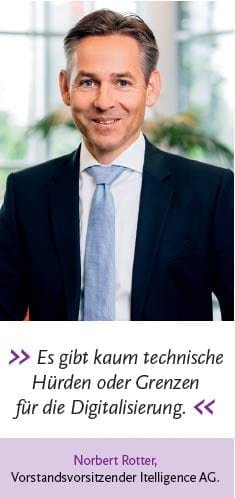Digital transformation from the midmarket specialist
![[shutterstock.com:569504716, Mirexon]](https://e3mag.com/wp-content/uploads/2016/06/shutterstock_569504716.jpg)

Digitization is leading to far-reaching changes in the German economy. Four out of ten companies (40 percent) have already launched new products or services as a result of digitization, and 57 percent have adapted existing offerings.
By contrast, one in eight companies (12 percent) had to withdraw goods or services from the market because of the digital transformation. This was the finding of a representative survey of 507 companies in all sectors with 20 or more employees commissioned by the digital association Bitkom this year.
Norbert Rotter, Chairman of the Management Board of Itelligence, confirms:
"There are hardly any technical hurdles or limits to digitization today."
The Bitkom study shows that many companies are inadequately prepared for the digital transformation. A good quarter (28 percent) still have no digital strategy.
However, the trend is positive: last year, 37 percent of companies still had no digital strategy. At least 27 percent currently have strategies for the use of digital technologies in individual areas of the company (previous year: 24 percent).
By contrast, 43 percent have a central strategy that takes into account various aspects of digitization and is driven by top management (previous year: 39 percent).
The following question naturally also arises: What is a digital transformation?
"One of our customers put it so aptly the other day that I wrote it down right away."
explains Andreas Pauls, Managing Director Germany at Itelligence AG:
"We want to digitize all processes in the company, insofar as they do not serve to maintain relationships with customers, suppliers and employees."
You can't put it more beautifully than that, says Pauls and adds:
"It's only the interpersonal that we bracket out, but otherwise this development is transforming the whole company, all the processes."
Where to start?
 "The digitization of the economy is picking up speed".
"The digitization of the economy is picking up speed".
said Bitkom President Thorsten Dirks at the opening of this year's CeBIT in Hanover.
Almost two-thirds (64 percent) of the companies surveyed by Bitkom say that their business model is changing as a result of digitization. In the previous year, the figure was 55 percent.
"By now, most managers have recognized the challenge. Now companies need to pick up the pace and actively drive the digital transformation forward."
Dirks emphasized. Thus, one piece of advice from Rotter and Pauls is also: Start, start, start! But where to start? Top-down or bottom-up?
"We are observing both approaches," says Andreas Pauls, describing the current pioneering work in the SME sector: starting with small pilot projects without an overarching plan on the one hand, and developing a fully comprehensive digital strategy before making the first investments.
"I like to compare it to a sporting challenge: If I want to cross the Alps by bike, I should definitely test my form and my equipment with a few climbs beforehand.
However, these test drives are not the starting point for the big trip. It's then a matter of finding the point where the big tour really begins. Then I have to draw a line under the practice runs and get serious."
In terms of digital transformation, pilot projects are important and should be given high priority in the company. This is the only way to gain experience, identify potential, and generate internal enthusiasm.
"But if you want to use micro-projects later on as the technical foundation of your digital strategy, you will end up with a confusing landscape and will never be able to exploit the possibilities"
Pauls warns, and Rotter adds:
"The most important thing is the preliminary consideration: What can be digitized at all in our company? And then I have to find motivated employees to pursue initial approaches."
The digital transformation
According to the results of the Bitkom survey, 72 percent of the managing directors and board members surveyed name digital transformation as a challenge for their companies - making it the top issue behind securing the need for skilled workers (73 percent).
This is followed at a distance by internal challenges such as managing strong growth or restructuring (58 percent), external factors such as the political situation (43 percent) or weak domestic demand (23 percent).
Almost nine out of ten respondents (88 percent) see digitization as an opportunity for their company rather than a risk (9 percent).
Only 3 percent say that digitization has no influence at all on their company.
Andreas Pauls adds:
"You can start small. A good practice run, for example, is to issue service orders on your smartphone instead of on paper. From that, more ideas emerge. The goal is not so much to do the individual project well.
The main thing is to develop a general awareness that digitization holds endless possibilities. After that, it will be possible to tackle larger stages on the actual route to the future:
full IT support for the composition of individually created machines or preventive maintenance of machines via sensor connection."
At Itelligence, they have recognized that it is about changing processes, equally between things and between employees - and across companies.
Only at the end is the transformation of business models, such as the well-known example of a company selling the amount of compressed air instead of compressors.
Industrial companies will have to overcome important challenges in the next two years, as the market researchers at IDC already ascertained last year.
The uncertain development of the global economy and the assertion against competition from low-wage countries increase the pressure to act. Above all, the reduction of costs, the increase in sales and revenue, and the improvement of internal processes are burning under the nails of the decision-makers.
Solving these tasks provides a good starting point for Industrie 4.0 initiatives, write the IDC analysts. "We need the right mix of employees and the courage to break new ground," emphasizes Norbert Rotter.
"The whole scenario sums up for me in this view: IT has now become a strategically essential factor in business growth and will be even more so in the future."
But the IDC experts also found that digitalization in the manufacturing sector - i.e. Industry 4.0 - is only rated by IT managers as a major challenge over the next two years.
On the part of those responsible for production and specialist areas, there is still a lack of understanding of the extent to which technological developments will change the business activities of their company.
Thus, IDC comes to a similar conclusion as Itelligence CEO Rotter: "IT has the opportunity to take the lead in driving forward digitization, to initiate dialog between IT, specialist departments and management, and thus to establish itself as a partner of the specialist departments at eye level.
Good advice
"Companies need a strategic approach to digitization and anchoring it at the top of the company"
said Bitkom President Thorsten Dirks. Business management and technical know-how should come together.
"With our reputation as an SAP pioneer and midmarket specialist, however, we have a special obligation"
emphasizes Norbert Rotter in the E-3 exclusive interview on page 49. Preparing companies for the wave of digitization, as a forward thinker and implementer, this role of Itelligence consultants is becoming increasingly demanding.
Dirks said at this year's CeBIT:
"The ICT industry is not just a supplier of equipment, software and telecommunications services, but a strategic partner in the digital transformation of its customers' business models."
Digitization has a direct impact on the employment situation in the economy.
The vast majority of companies surveyed by Bitkom say they need more employees with digital skills. These days, it's not just about the usual office software, but about special skills for the respective fields of work, from business applications for controlling, marketing or finance to CAD programs for engineers or content management systems for maintaining websites.
Four out of five companies say they offer training for this purpose.
"Companies need to strengthen the digital competence of their entire organization"
Thorsten Dirks said.
"This ranges from training for employees to appropriate recruiting to embedding IT expertise at the top of the company."
Andreas Pauls from Itelligence is certain that the linking of three components is crucial, which no one else can offer in this form and quality:
"First, our process expertise for medium-sized businesses.
Second, our product expertise in customer engagement and commerce. We have recently strengthened this again through the acquisition of the Pforzheim-based company ITML for topics such as CRM, omnichannel and, of course, SAP Hana.
And third, strategy consulting - our ability to build a big picture from different methods and create a roadmap."
Bear responsibility
Bitkom is calling for the position of Chief Digital Officer - in Germany, this function is still largely unknown, with only two percent of large companies with 500 or more employees having a CDO.
For the economy as a whole, this statistically means a value below the perception threshold. If there is a central responsibility, coordination lies either with the management or with the person responsible for IT or the Chief Information Officer, Andreas Pauls recognizes in his professional practice that the decisive input always comes from the specialist departments, for example from a production manager.
IT plays a role in moderating the process.
"We also advise users to include younger leaders and talent"
Pauls recommends.
"When it comes to using new media and the latest devices, I am hopelessly inferior to my teenage children. And in the same way, digital natives often bring amazing impetus and speed to projects in companies. We have to be willing to learn from each other."
Do you need a CDO, Chief Digital Officer, for the digital transformation issues? Pauls has this to say:
"You need someone in top management to coordinate and implement the digital strategies. Digital transformation is a matter for the boss. Whether the role has to be called CDO, I rather put a question mark there."
For Norbert Rotter, digital transformation can only be implemented if manufacturers want to systematically improve their solutions and products in order to better reach their customers.
"The goal is to provide the best service to customers, earn their trust, and keep them as loyal customers across multiple channels."
The tools that SAP offers for this purpose, C4C and Hybris, are a huge opportunity for SMEs. The channels for reaching customers are becoming more and more diverse, and the technology must support this.
"The potential with SAP's new solutions was also one of the reasons to secure a strong partner in CRM/CEC in the south of Germany"
emphasizes Rotter. Pforzheim-based ITML has been part of Itelligence since June.
"There, in addition to regional proximity to our customers in southern Germany, I expect further positive impetus, particularly around the topic of customer engagement."
Source of knowledge
"Of course, we are in intensive discussion with SAP directly about the latest developments"
Andreas Pauls explains the first source of knowledge for Itelligence.
"But we also consistently seek proximity to universities and colleges. In addition to the targeted recruitment of university graduates, we have been running research projects at the Innovation Campus of RWTH Aachen University for years and using our development labs in the Group to develop ideas and scenarios around Industry 4.0.
Many Itelligence colleagues brought the topics into discussion with customers years ago, so we've come a long way today despite the many facets of IoT. But what I would really like to recognize most here is the achievements of the users:
the exchange with customers who are testing IoT in the company. We were able to learn a lot and sharpen our consulting and project expertise in practice. That is the fortune of the brave.
Today, we see ourselves well positioned: Our workshops on digital strategies, for example, are real hits and the starting point for countless projects."
The digital association Bitkom has welcomed the further measures presented by the EU Commission to strengthen the digital single market as a step in the right direction. Particular attention should be paid to small and medium-sized enterprises, which need the most support in digitization.
"European SMEs have often had an outstanding market position to date, which must be maintained and further expanded in the course of digitization"
said Bitkom CEO Dr. Bernhard Rohleder. Bitkom therefore already recommended the creation of "digital hubs" at CeBIT.
In these hubs, the flagships of the German economy are to form a digital ecosystem together with SMEs, startups, IT companies, universities and research institutions.
"We need to join forces and create digital focal points with international appeal"
said Thorsten Dirks. Knowledge also includes a culture of error:
"The topic of digital transformation is still so fresh that the only mistake can be to sleep through it"
explains Andreas Pauls in an E-3 interview.
"We sometimes hear, 'We need to implement SAP Hana before we get started.'
But business departments and management may see the introduction of Hana only as an IT investment, as an overhead cost: why should we replace systems that work?
What good does it do me if the ERP gets faster?"
At Itelligence, we are convinced that Hana comes into play better when the first scenario is in place and large volumes of data are generated. Then it is the perfect technical basis - also for a comprehensive digital strategy. And it is then clear to everyone involved what return on investment is expected, emphasizes Pauls.
It can always happen that a detailed function that a user needs is not there. But with the development speed that SAP shows, it will be added quickly.
"The technological offering is currently further along than companies are in implementing digitization. After all, it makes sense to introduce such a new, comprehensive technology in adapted steps, but in a strategically well thought-out way."
Andreas Pauls knows from his professional experience.
Future
However, not only the industrial companies, but also the providers of Industry 4.0 solutions have a lot to do, say the IDC analysts.
The market environment is very attractive for providers such as Itelligence, and rising Industry 4.0 budgets are expected in the coming months and years.
In addition, IT providers in particular are perceived by industrial companies as preferred Industrie 4.0 providers.
"SAP provides the technological foundations, we provide the consulting and add-on products that precisely meet the needs of our midmarket customers"
Andreas Pauls describes the win-win situation for users and providers.
"We are the tailor, SAP provides the fabric and the cuts. With it.machinery, for example, Itelligence has developed a fully integrated solution based on S/4 Hana specifically for companies in the manufacturing industry, which our customers use to manage all their processes."
CEO Rotter concludes on the further development and regional differences of the globally active Itelligence:
"The difference is probably most apparent between the U.S. and the U.K. on the one hand and Germany on the other.
In the Anglo-Saxon countries, the speed is high - also driven by a strong start-up scene. Companies are giving digitization a chance without any pain.
In the German-speaking world, other values count to some extent: consistency, sustainability and reliability. We are not playing these off against each other. Both approaches have their justification. Germany, for example, has become a pioneer when it comes to safety."







